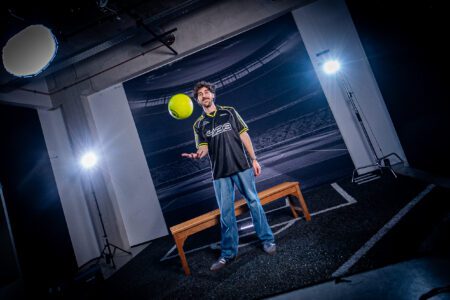
Think about this: you’ve loved football since you were a kid. You support Manchester City FC, the powerhouse club from Manchester, England. Like many, you probably dreamed of going pro or becoming a coach. When it came to university, you’d lean towards sports science or coaching, right?
But not Haysam Shakeel. He became a philosophy student at the University of Liverpool.
A Philosophy BA (Hons) helped him explore the “why” behind human behaviour, decision-making, and ethics — questions that appear in every match. From tactical choices to leadership under pressure, he saw football through a new lens.
As a philosophy student, he learned to think critically, analyse complex information, and build strong arguments. As Haysam puts it, “One of the first questions employers ask me is — why did you do a philosophy degree? At a surface level, people might not understand it. But once you enter philosophy, it’s all about reasoning, logic, and critical thinking.”
Today, he’s a coach and all the better for it, thanks to his unconventional degree.
In football, you’re flooded with ideas, from teammates, training manuals, past games, and your own instincts. Coaching means filtering through all of that and creating a plan that works. It’s a lot like writing a philosophy essay: take in dozens of contrasting views, extract the most useful ideas, and shape them into something clear and actionable.
“That skill transfers directly to coaching football,” he says.
With it, Haysam went from coaching the third team at the University of Liverpool Football Club to leading the first team in just 10 months. To top it off, he also recently became an Academy Coach at Fleetwood Town FC, an English professional football club.

Haysam (middle) discovered his passion for coaching when he was 13, after he started volunteering. Even at that time, his passion for coaching was stronger than his passion for playing. Source: Haysam Shakeel
From Abu Dhabi to the UK
Haysam grew up in Abu Dhabi, where he spent nearly two decades before heading to the UK for university. From an early age, he had two constants in his life — football and a curiosity about the world beyond the UAE.
He grew up looking forward to Physical Education classes, spending hours on FIFA, and watching games with family. “I recently found out that my granddad, whom I never got to meet because he passed away shortly after I was born, was apparently an Everton fan,” he says. “Generations of family have been huge football fans.”
That strong sense of identity — both in football and culture — followed him through his school years. He attended Yasmina British Academy, a British international school, where he completed his GCSEs and A Levels.
“Thanks to that education, when I came to the UK, it wasn’t too much of an adjustment period,” he says. “I moved here when I was 20, and now I’m 24 — so it’s been almost four years.”

To become a football coach, Haysam believes one needs to have a genuine love for the game. Source: Haysam Shakeel
Growing up, England stood out as the place to go pro. But that aspiration was crushed when Haysam, then 15, injured his knee while playing in a park.
The initial pain didn’t seem serious, and early medical checks found nothing. But months later, a more serious twist during a training session revealed the truth — a grade 3 ACL tear, which means a complete rupture of the anterior cruciate ligament, resulting in full joint instability.
“This meant I needed surgery, but I had to wait until my growth plates closed,” he says. “That was a whole process in itself. Only after that would I have been able to go back into football. By that time, I had already moved into coaching and given up the dream of playing at a high level. It’s been a long journey. It was tough at the time, but new doors in coaching opened afterwards — and that has been the case for me.”
Looking back, coaching had always been part of his story. One of his brothers had outstanding skills on the pitch. Haysam often found himself at his brother’s training sessions and games, helping out however he could. That support role evolved into something deeper.
He became invested in player development and welfare. Even at 13, long before his injury, he volunteered and coached within his school.
When the injury happened, it simply urged him to take on a coaching role at City Football School in Abu Dhabi.
“By the time a year passed, I got more responsibilities,” he says. “I also received a small offer to work on camps and with the Academy, with different age groups, from under 10 to under 16. It was a good experience.”

When Haysam returns to the UAE for holidays, he often feels homesick for Liverpool, a feeling many international students share after building a home away from home. Source: Haysam Shakeel
Finding home and purpose in Liverpool
Haysam first attended a university in Manchester, but moved to Liverpool because he had more friends there and found the programme better aligned with his interests.
Add to that the city’s unique energy and the potential it offered for launching side projects, particularly in football, and Haysam only became happier that he made the decision.
“Liverpool is the most vibrant city I’ve been in when it comes to the people you meet and the vibe and atmosphere around the city,” he says.
In his first year at the University of Liverpool, Haysam applied to be the head coach of the university’s fifth football team.
He was rejected — not for lack of skill, but because the club felt he was overqualified.
The following year, a new opportunity arose for the third team head coach role. Haysam quickly updated his CV and applied.
Within days, he was speaking with the club president and shortly after, had a final interview with the first team coach.
He got the job, marking the real beginning of his coaching career.

Haysam has been the First Team Head Coach for over 15 months, leading the team to remarkable achievements both on and off the pitch. Source: Haysam Shakeel
The team competed in the BUCS football league, a tough competition featuring some of the best university football teams in the UK. “The team that finished first won pretty much every game,” he says. “We finished second, and our players did an unbelievable job to push the winners right to the end.”
When the first team head coach position opened up, Haysam applied along with the second team coach and others. The selection involved an application, interview, and presentation. What set Haysam apart was not just his thorough preparation but also the strong relationships he had built within the club. People saw his clear vision for the club’s future and believed in it.
“I was at a restaurant with my best friend when I got the call saying I got the job,” he says. “I couldn’t hide my excitement that day. I’m so grateful to the club for trusting me in that position because what we’ve achieved in the last year has been nothing short of brilliant, both on and off the pitch.”
This role brought new responsibilities and a broader scope than his previous positions. “As a first team head coach, you’re primarily focused on the first team’s results — getting them to the highest possible stage in BUCS and setting the team up to win every game, while providing a really good experience for the students,” he says.
His role also includes overseeing not only the first team but the entire club, which has five teams and around 120 to 130 people, including staff, volunteers, and players.
Balancing this demanding role with university was no small feat. During football season, his schedule was packed. When the season ended, he shifted gears to focus on academics, often spending long hours in the library.
“You have to make time,” he says. “Sometimes, that means prioritising. I’ll leave some coaching sessions to my other staff so I can focus on university for some weeks. It really depends on what’s needed at any given time. Staying organised is key.”

Haysam advises students to seize opportunities by building strong foundations, gaining experience, learning continuously, and building good relationships. Source: Haysam Shakeel
His future aspirations
Haysam is about to graduate, and he plans to apply for a Graduate Visa, which allows international students like himself to stay in the UK for at least two years after successfully completing their programme.
There’s also the possibility of completing a master’s degree while continuing his coaching project, but he’s unsure if balancing both is realistic. For now, the Graduate Visa route feels like the most practical option. “I also have aspirations to complete my legal qualifications in the next 2 years, as that is also part of my career goals,” he says.
For now, he will be coaching the University of Liverpool Men’s Football Club. That’s not all. All his hard work paid off when he recently became Academy Coach at Fleetwood Town FC, where he will be coaching for the 2025/26 season.
His advice to international students aiming to break into football is clear: network actively, volunteer, and put yourself out there with genuine passion.
“You’ll encounter people who are blunt to your face, telling you that you’ll never make it, or that you don’t have the qualifications, or that there are no jobs or office opportunities for you at the moment,” he says. “You’ll hear a lot of that, but you just have to keep going.”










